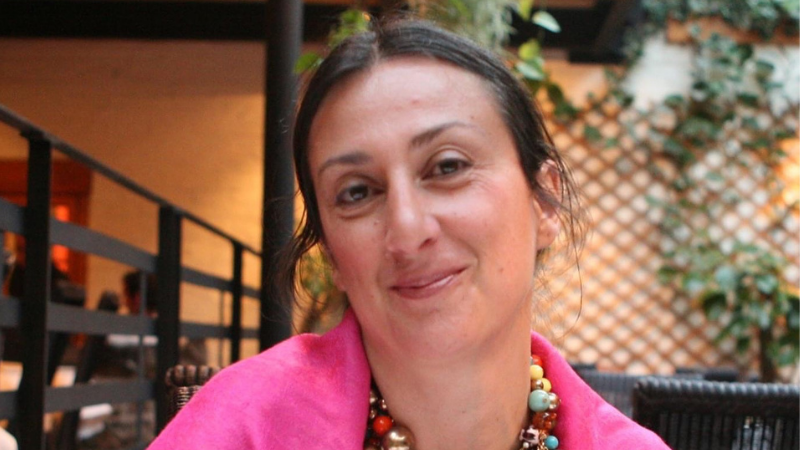“Isn’t that where they killed that journalist?”
It’s the first thing anyone says to me when I mention I lived in Malta.
Daphne Caruana Galizia’s name is remembered around the world, but few of the people I speak to know that her story is far from over.
They have vague recollections of newspaper headlines about the arrest and conviction of the hitmen who killed her, and they’re under the impression the case was closed.
Their jaws drop in surprise when I tell them so many others connected to Malta’s most shocking political assassination — from the mastermind to the bomb makers to the politicians whose names come up again and again — have not been held accountable.
It’s been seven long years since that terrible day in October, and justice is as far off as ever.
The public inquiry tabled its damning report in 2021, finding the Maltese state responsible for Daphne’s death. It’s worth reminding yourself what it said.
By creating a climate of impunity where corrupt ministers were protected, it said, where regulatory and law enforcement institutions were toothless, and where business interests colluded with politicians to promote lucrative large-scale projects regardless of whether they were in the public interest, former prime minister Joseph Muscat presided over impunity that “like an octopus spread to other entities like regulatory institutions and the police, leading to the collapse of the rule of law.”
This state of impunity still exists. Corrupt ministers are still protected, and regulatory and law enforcement institutions have yet to show any teeth.
The inquiry also found evidence “that powerful elements in public administration could have been involved in illegal activity which was the primary focus of the investigations of the murdered journalist.”
Such activity included “abundant proof of excessive closeness and intrigue between elements of public administration at the highest levels and influential businessmen interested in promoting large development projects.”
Three years later, business interests are still colluding with politicians to promote their own interests instead of yours.
The public inquiry report also said the hired killers were so sure they’d get away with Daphne’s murder that they bragged about “their contacts with ministers, the chief of staff, and other persons at the heart of power,” referring to them in court as “no. 1,” “the old man,” and “the king”, and high-ranking police officials and public authorities acted “in a manifestly illicit way, if not illegally” to assist suspects by deflecting journalists from the murder details that were being uncovered.
The inquiry’s report also included a list of recommendations to improve the safety of journalists in Malta. Have you heard anything about them lately? Me neither. Three years have passed since the recommendations were published, and none have been implemented.
A pile of people have been charged with money laundering linked to the corrupt hospitals deal — including disgraced former prime minister Joseph Muscat — but an army of the country’s best criminal lawyers is facing off against inexperienced public prosecutors as they scramble for loopholes to save their clients from accountability in a case that experts say has been “set up to fail”.
The government is still led by Muscat’s former lawyer and hand-picked successor, and the man who turned Malta into his personal kingdom of Kickbackistan is still enjoying office space at your expense, as well as state-funded cars and assorted additional perks. One wonders if a ‘Get Out of Jail Free’ card was part of the severance package he gave to himself.
Those who had the most to gain from Daphne’s silence are still making hay while the sun shines — and I don’t think she would be surprised to know this.
Her fight ended on that terrible day in October 2017, but she left us with some parting words in an article published four months before her death, words that I think might hold the key to change.
She said, “It is people who vote for political parties, and not political parties which put themselves into power. Would Muscat’s party have been returned to power in any other European Union member state outside Italy? That is the question we have got to address.”
It’s the question I tried to answer in my book A Sunny Place for Shady People. I wrote it to help outsiders understand how a journalist could be assassinated in a European Union member state, how those who hated her could celebrate her death shamelessly and publicly, and how the people behind it continue to evade justice.
It was published in the United States and is available in bookstores around the world, but my publisher wasn’t able to get it into bookstores in Malta. If you know anything about island politics, you can probably guess why.
That problem has been solved, at least, through an alternative arrangement. A special edition of A Sunny Place for Shady People is now available locally in paperback from Midsea Books.
Daphne was dismissed as a blogger and targeted for exposing the misdeeds of the powerful. When she was sufficiently isolated, she was murdered.
Seven years later, Prime Minister Robert Abela is lamenting the decriminalisation of libel by people who “pretend to be journalists but aren’t” and urging Labour supporters to stand up to these people “who feel entitled to preach about what’s right but have a malignant agenda” — an agenda that isn’t in accord with his own.
“What’s important is that we don’t let freedom of speech be abused,” he said. And so the pattern is repeated.
Malta hasn’t changed in the wake of the country’s most shocking political assassination. What was done to Daphne Caruana Galizia could be done again today.













Looking forward to reading your book